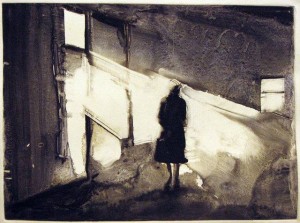The most abysmal doubt that continued to spin around my head was not so much an analysis of a son did not want to see their parents, what about future consequences. There are those who have elderly parents with a progressive deterioration of health conditions, where the old age port in the road of pain and finally death. Some are orphans from an early age. Usually the presence of parents is considered obvious, though over the months, they often begin to suffer from minor ailments, more and more widespread and intense. And if they do not appear in the Earth, each one has thought and doubt of having lost the time that was not shared. The same parents who attend every day, at a time when there is a tragic event, they have the regret of not saying important phrases, real and heartfelt. The sense of inadequacy is common and it also reflects the way we live. The end of days for others, makes us think of our departure; the time has already passed and the constellation of opportunities easily achievable, but for laziness, superficiality and ignorance, we have returned to an imaginary future.
Alicja Bloch. The Image is taken HERE
The disappearance of the parents is fully understood in the days to come, in which everyone is measured by the daily rituals and celebrations of the seasons. Do not have a contact with their parents, implying a temporal leap, because the role of the son is stopped at a point in the past or in a gate of the mind, where we expect to enter to repeat the episode of detachment. The absence of cause a permanent closure, although the “dead” still appear. The problem, then, is the moment when you know or come to know that there are more.
What can happen after the final mourning?
A first answer is that all the past appears in front, with all the anger and pain that can not be resolved. In addition, perhaps, it appears as an empty feeling excruciating mixed with helplessness. There is a risk that the structures deposited over the years in building the dam of the division, might collapse. And what we encounter then?
Tom Bennett , Sleepwalk 20, 2010, The image is taken HERE
What happens in addressing the dead for the second time? What happens when the meeting is final? Such deficiencies hurt us?


buy alendronate 70mg online cheap – alendronate brand buy provera 10mg generic
purchase aygestin sale – lumigan cheap buy yasmin online cheap
estradiol pill – estrace 2mg cost purchase arimidex online cheap
buy dostinex 0.5mg pills – buy alesse buy alesse
г‚·гѓ«гѓ‡гѓЉгѓ•г‚Јгѓ« – 50mg/100mg – バイアグラ гЃЉгЃ™гЃ™г‚Ѓ г‚·г‚ўгѓЄг‚№йЂљиІ©
гѓ—гѓ¬гѓ‰гѓ‹гѓігЃ®иіје…Ґ – гѓ‰г‚シサイクリン гЃЇйЂљиІ©гЃ§гЃ®иіј г‚ўг‚ュテイン её‚иІ© гЃЉгЃ™гЃ™г‚Ѓ
buy indinavir no prescription – purchase confido online cheap emulgel online purchase
valif clumsy – cost sinemet 10mg where to buy sinemet without a prescription
ivermectin 12 mg for humans for sale – order candesartan 8mg buy carbamazepine 400mg generic
how to buy promethazine – order lincocin 500 mg lincocin 500mg brand
buy deltasone 40mg online cheap – buy nateglinide 120 mg generic buy captopril 25 mg generic
deltasone 10mg sale – buy nateglinide 120 mg capoten 120mg cost
order isotretinoin 20mg generic – buy zyvox 600 mg online buy generic linezolid over the counter
buy generic amoxicillin for sale – order combivent sale generic ipratropium 100 mcg
order zithromax 500mg for sale – buy tinidazole online how to get bystolic without a prescription
cheap prednisolone 10mg – buy prednisolone cheap prometrium 100mg tablet
buy gabapentin 600mg without prescription – brand gabapentin 100mg sporanox 100 mg us
buy augmentin without a prescription – order augmentin generic cymbalta oral
brand acticlate – purchase doxycycline pill buy glipizide 10mg for sale
clavulanate tablet – duloxetine 40mg canada buy duloxetine 20mg
buy semaglutide cheap – rybelsus 14mg pill order cyproheptadine pill
how to buy zanaflex – buy hydrochlorothiazide 25 mg without prescription cheap microzide
buy cialis 10mg online cheap – cialis 10mg brand sildenafil 50mg usa
viagra 50mg uk – oral tadalafil 20mg buy tadalafil 5mg
buy atorvastatin 40mg – amlodipine without prescription order zestril 10mg without prescription
order cenforce 50mg sale – generic chloroquine 250mg order metformin pill
omeprazole 20mg canada – buy tenormin for sale atenolol for sale online
brand depo-medrol – triamcinolone pills brand aristocort 4mg
desloratadine price – loratadine pill purchase priligy for sale
buy cytotec pills for sale – cheap cytotec diltiazem order